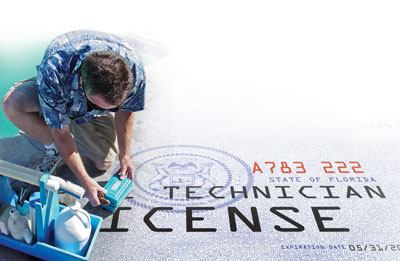A bill introduced this month in the Florida legislature would amend current licensing requirements for all swimming pool service technicians.
HB 1259, sponsored by state Rep. Larry Ahern (R-St. Petersburg), expands the scope of the state’s current pool service license while eliminating a provision that was considered a major barrier to entry for would-be techs. Its key supporters include the Florida Swimming Pool Association as well as the state’s leading retailer, Pinch A Penny, which has a 200-store network.
“We’re always looking for ways to raise the level of professionalism in our industry,” said Wendy Parker Barsell, executive director of FSPA in Sarasota, Fla. “Having the same basic education and licensing requirements for everyone helps keep our standards high while creating a more level playing field.”
Though the statewide pool industry remains approximately 70 percent below the peak years of 2005-06, the service sector has been relatively stable throughout. As a result, unwanted — and often illegal — competition has flooded the field in recent years.
Some estimate as many as 4,000 service techs are operating illegally across the state.
But industry professionals are optimistic this latest effort at regulation will encourage those on the fringes to join the mainstream.
Among its two main provisions, HB 1259 broadens the type of work that falls under the existing service technician’s license requirements. Currently, the law it only calls for licensing of service professionals who perform construction, remodeling and installation or repair of equipment.
But if the bill passes, it will mandate that professionals who perform cleaning, maintenance and water treatment be licensed as well.
In addition, the bill revises an important eligibility requirement that many believe has prevented applicants from seeking licensure.
Currently, an individual must have at least one year of proven experience in the field plus confirmation by a licensed service company before he or she is able to take the service exam. But that often created a roadblock. “Part of the problem is that nobody would [sign off] because they didn’t want the competition,” said Jennifer Hatfield, a Sarasota-based lobbyist who represents FSPA.
Instead, the new measure mandates that an applicant complete 20 hours of hands-on, in-field instruction. This complements the 60 hours of classroom education that still would be required under state law.
“So we’re not really adding more regulation; we’re just fixing something that was missing from the current legislation,” Hatfield explained.
While this isn’t the first time the industry has sought tighter statewide guidelines, it does represent perhaps its best opportunity to date. The movement has a strong advocate in Ahern, a longtime industry member now entering his second legislative session.
However, questions remain as to how the bill, if it becomes law, would be enforced by the Department of Business and Professional Regulation. But it certainly would close a loophole that some advocates believe has existed for far too long.
“Without this being accomplished, enforcement doesn’t matter,” said Gary Crayton, owner of Bay Area Pools and Spas in Tampa, Fla. “Like any government agency, if they’re not generating fees or penalties, they’re not interested. But if this passes, you now have every incentive to stop a pool guy in a truck that isn’t marked, and collect a fine if he isn’t licensed.
“But the biggest concern from my standpoint is safety,” he added. “The unlicensed guys have no requirement to learn about any laws that have come about in the past
several years. And because they make mistakes every day, the ones who really suffer are the homeowners. So, as an industry, we look terrible.”
A similar bill was introduced in the Senate. SB 1544 is sponsored by Sen. Thad Altman (R-Viera) and would go into effect in October 2013.




